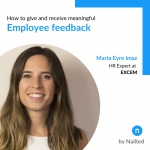
Conducting one-on-one meetings on a regular basis is crucial; these are an important touchpoint between managers and their team members. Do you want to know how managers conduct one-on-one meetings?
David Bonilla, CEO & Founder at Manfred, talks about how he conducts one-on-one meetings in order to maintain healthy, transparent and ongoing communication. Do you conduct them the same way?
LAURA HERNÁNDEZ: Welcome, everyone. I’m Laura Hernandez, and this is Company Culture Matters by Nailted.
LAURA HERNÁNDEZ: In this episode, we will listen to the CEO and founder at Manfred talk about how he conducts one-on-one meetings. Do you conduct them the same way?
DAVID BONILLA: The one-on-ones are for employees, not for managers and they should manage the agenda. What I try to do is to follow, you know, this checklist to make a lot of questions, instead of talking about the answers and encourage people to talk a lot.
LAURA HERNÁNDEZ: Usually how employees feel about their managers, defines how they feel about their company and their job. This is why it is so important to build positive relationships with your people to build a culture of trust. To do so, meeting each one of your team members regularly is crucial. Here it is where one-on-one meetings, become an important touchpoint for managers and their team members. In this episode, you will obtain visibility on how a manager, CEO & founder conducts one-on-one meetings in his company. At the end of it, you will have constructed your opinion on how to conduct meaningful one-on-one meetings with your people.
LAURA HERNÁNDEZ: Hello David Bonilla, CEO & Founder at Manfred, thank you for accepting our invitation to talk about one-on-one meetings from a manager’s perspective.
DAVID BONILLA: Hi! how are you?
LAURA HERNÁNDEZ: David, you manage many people and I know you have scheduled regular one-on-one meetings with them. Could you tell us why you considered one-on-one meetings indispensable?
DAVID BONILLA: Yeah, sure. Yeah. I mean, it’s like a probe, you know, to test what’s going on in your company to check if it is, still a good place to work. This is the main goal for me, you know, to test the waters. To know if everything is okay, from the people.
LAURA HERNÁNDEZ: David, you mentioned that one of your goals for one-on-one meetings is to know how your people are in your company. But besides that, do you set up any other goals in your meetings, like specific goals for each person or like general goals?
DAVID BONILLA: Yeah, sure. Based on previous one-on-one meetings we set goals person by person. I also manage common goals for the whole company. Like for example, improving sales or ask about our roadmap or whatever, you know? So if I want to know or want to get some insights from the team for a very specific topic, I set it as a goal also for my one-on-ones.
LAURA HERNÁNDEZ: David, you just said that you prepare your goals in advance. Like what do you want to achieve in the conversation, but what else did you prefer for the conversation? I mean, do you have any checklist you go through before having your one-on-one to make sure you get what you actually want to get?
DAVID BONILLA: Yeah, I use that Agenda feature that we have in Nailted to set some points and also the private notes just to write the topics that I want to mention. So yes, this is how I prepare the one-on-ones. I kind of checklist about topics that I want to go through.
LAURA HERNÁNDEZ: And regarding those topics, do you have like topics you always bring into the conversation?
DAVID BONILLA: Yeah. For example, how do you feel, what about your colleagues? Is there any problem? What I want to know exactly is if the vision and mission of the company are well known and if we are doing a good track to achieve that.
LAURA HERNÁNDEZ: So, we could say that you direct your questions to understand your people, feel comfortable, and if they are aligned with the vision of the company, but do you have any other questions you usually ask them?
DAVID BONILLA: Well, in the end, I am a product manager. This is my, my main role or the role I like most, I have a bunch of questions, about the product. For example, if they know some competitors that are doing quite well or are performing quite well. If they have spoken with customers about our features about what we are doing, if they have insights about the market, or if they think that we should build a very specific feature. As I mentioned before, I think that one-on-ones are a great tool for communication on both sides. I try to take advantage of that to get some insights from the team and from their product perspective.
LAURA HERNÁNDEZ: I guess you will agree with me that one-on-one meetings are kind of the foundation of giving and receiving feedback. Feedback is not only essential to manage an efficient, healthy, and happy team. It also helps people grow and evolve towards accomplishing their career goals, whilst achieving at the same time as a success for the company. David, how do you give feedback to your people and how do you encourage them to give you feedback?
DAVID BONILLA: Well, first I asked them to give me feedback about myself. I think that is a very good starting point, you know, and I tried to encourage them to be completely transparent. I think it is crucial. It’s key for us to manage people properly. If they don’t trust me enough to give me very, very, very, very transparent feedback I’m failing to do my job as a manager. After that, obviously, I give them feedback. I’m trying to focus on the topics they have asked for. And usually at least in my company, in Manfred, they ask me about very specific topics. Like, “what do you think about how I am dealing with a recruiting process?” or “what do you think about how I am working with my colleagues?”We used to focus on very specific topics, different topics, for each one-on-one.
LAURA HERNÁNDEZ: David to conclude our conversation, I guess, as you perform many one-on-one meetings, you have encountered certain situations or you have found certain mistakes that you now know. So, could you tell us a bit about those, and how you resolved those situations?
DAVID BONILLA: At least for me, the most common problem is that I talk too much. And I think at least from my perspective that the one-on-ones are for employees, not for managers and they should manage the agenda. What I try to do is to follow, you know, this checklist to make a lot of questions. Instead of talking about the answers and encouraging people to talk a lot, this is the most common problem that we have that at least in theory, the perfect one-on-one should be 90% of the time for the employee 10% of the time for the manager.
DAVID BONILLA: Usually, we only get 50/50. What you mentioned is, is really interesting because it’s actually done that the one-on-one meetings are not a manager’s meeting. Those are the employees’ meetings. We all should take into account that they have to manage the agenda. They have to be involved. I think that if they ask for information it is because we have a problem with communication. We need to communicate more because one-on-ones are for them. Fortunately, I think that Nailted gave us a tool and a framework to manage properly one-on-ones and well we are excited about that.
LAURA HERNÁNDEZ: We couldn’t be happier to hear that. David once again, thank you so much for sharing with us those great practices for conducting one-on-one meetings and giving us visibility on how you do it in Manfred. And I’m sure our audience found it as worthy as we do.
DAVID BONILLA: It was my pleasure. Thank you very much.
LAURA HERNÁNDEZ: That’s it for this episode on how managers conduct one-on-one meetings of Company Culture Matters by Nailted. Special thanks to David for sharing with us his way to manage one-on-one meetings at Manfred. If you want to discover what he’s up to, you can connect with him on LinkedIn. Also, if you want to keep learning from experts on topics regarding company culture, take them out on nailted.com/podcast.
LAURA HERNÁNDEZ: Manfred uses Nailted to build the company based on feedback and recognition. Nailted is the employee engagement platform for people on nature teams who want to deliver the best employee experience. If you want to know how Nailted can help your company improve their company culture and their employee satisfaction check out Nailted.com.
LAURA HERNÁNDEZ: I’m Laura Hernandez, your host, and this is Company Culture Matters by Nailted.


No Comments